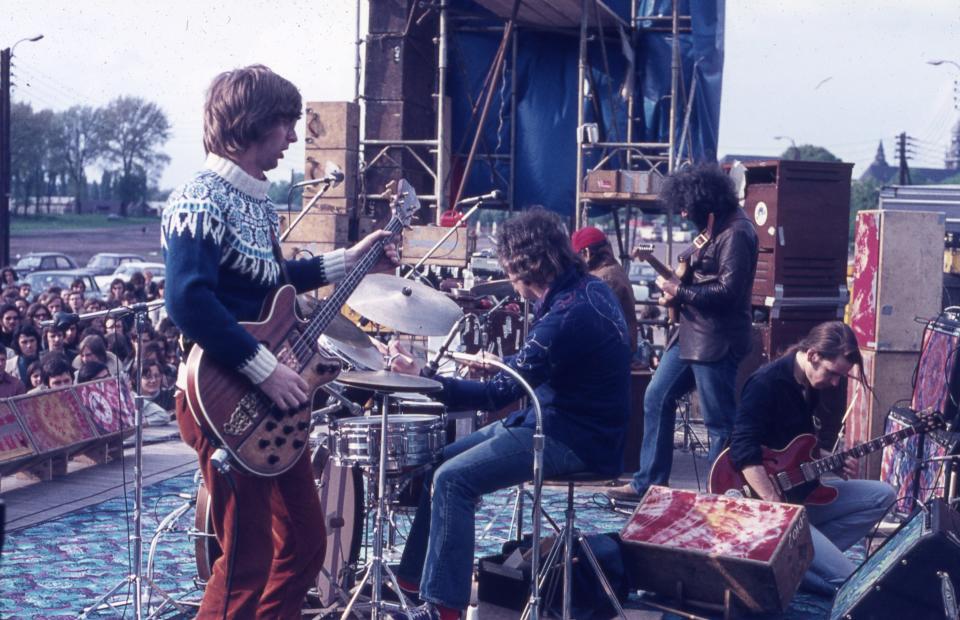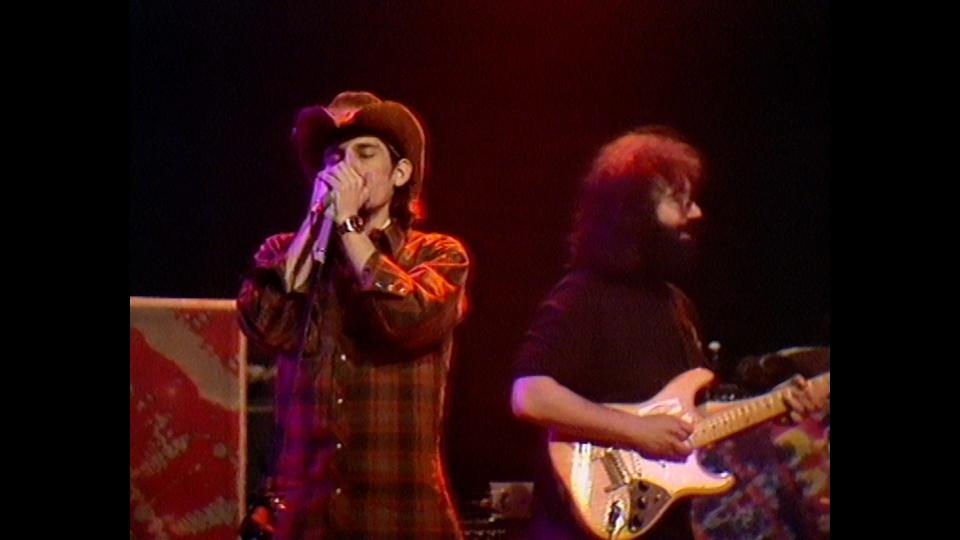Donna Jean Godchaux recalls the Grateful Dead's 'Europe '72,' 50 years later: 'Just blows my mind'
- Oops!Something went wrong.Please try again later.
- Oops!Something went wrong.Please try again later.
- Oops!Something went wrong.Please try again later.
It’s been 50 years since Donna Jean Godchaux’s long, strange trip with the Grateful Dead took her on a whirlwind tour across Western Europe, in the process creating a body of work that fans are still analyzing and celebrating.
“It’s amazing when I think back that when we were in Europe in ’72, that was half a century ago. That just blows my mind,” says the singer now known as Donna Jean Godchaux-MacKay. “It’s just incredible that it’s still relevant. The music was just astounding, and I’m just fortunate to have been a little bit a part of that.”
Spanning 21 concerts and a TV studio session across England and mainland Europe in April and May of 1972, the tour quickly became the stuff of legend. It was captured on “Europe ’72,” a triple live album released that fall. The trek was eventually documented on a 73-CD 2011 box set of more than 70 hours of music.
Bobby Weir talks friendships with John Mayer, Sammy Hagar: And why 'live music has to rebound'
The experience’s 50th anniversary has been commemorated this year with the 24-LP “Lyceum 1972: The Complete Recordings” collection of the tour’s four final shows at the Lyceum Theatre in London, as well as a remastered version of “Europe ’72” on CD, LP, streaming and digital download, and the four-CD set “Lyceum Theatre: May 26, 1972.”
The tour was also the subject of analysis for Season 5 of “The Good Ol’ Grateful Deadcast” podcast, and the annual gathering known as the Grateful Dead Meet-Up at the Movies returns Nov. 1 and 5 at select cinemas to present the part of the band’s April 17, 1972, performance at the Tivoli Concert Hall in Copenhagen, Denmark.
“Every year, and every tour, had exceptional moments and monumental shows,” Grateful Dead legacy manager and archivist David Lemieux says in a statement. “Only a few tours, though, can be said to have an exceptional night of music at every single show. Europe '72 is one of the tours that can objectively and definitively said to include A+ performances on every stop.”
The band's momentum after years of non-stop touring lead to a career peak in the spring of 1972.
“The Grateful Dead made sure they were making fans for life, and the recordings don't lie,” Lemieux says. “Every show was truly an event.”
Ready to buy a VIP concert package? Here's how to avoid getting ripped off

The tour arrived at the beginning of Godchaux-MacKay’s time with the band. Her then-husband, piano player Keith Godchaux, joined in October 1971, and Donna sang live with the band for the first time on Dec. 31 of that year in San Francisco.
A benefit for the Hells Angels followed at the Academy of Music in New York in March 1972, and then it was off to Europe, with Donna part of an unparalleled five-singer lineup for the Dead that included guitarists Jerry Garcia and Bob Weir, bassist Phil Lesh and harmonica player/organist Ron “Pigpen” McKernan.
“That was my first foray into the Grateful Dead ensemble singing, and so I had to find my way,” she says. “I was only used to the studio. I had never performed live before I went on stage with the Grateful Dead, and that was just months before boom, we’re off to Europe.”
Hailing from the storied Muscle Shoals area of Alabama, Godchaux-MacKay had already performed on records by Cher, Neil Diamond and Elvis Presley before joining the Dead – she can be heard on Presley hits including 1968’s “Suspicious Minds” and 1969’s “In the Ghetto.” But performing live with the Dead was a whole new world.
“It was all very brand new to me, and I had to get my bearings, not only learning the music but the whole different attitude of projecting music to the live audience,” she says.
Linda Ronstadt addresses 'worthless' border wall: Why her new memoir is called 'Feels Like Home'

The “Europe ’72” era is a key transitionary period in the band’s career. They were down to one drummer, with co-founder Bill Kreutzmann keeping the beat on his own as Mickey Hart was in the midst of his hiatus from the band. McKernan was in ill health before dying in March 1973 of internal hemorrhaging after years of heavy drinking.
“It was like the end and beginning of an era,” Godchaux-MacKay says. “Because Keith (brought) just an amount of energy in the band that could be a projection of what was to happen during the rest of the '70s. And the loss of Pigpen was just devastating. And Keith and I just loved him so much and were so fortunate that we were able to be in the band with Pig and to get to know him a little bit before he eventually passed.”
Donna Jean and Keith Godchaux were in the Dead until 1979, and Keith died in 1980 following a car accident. The couple's work helped to fundamentally shape the sound of the band during what many consider its artistic peak, with Donna Jean's harmonies becoming integral to songs such as "Playing in the Band" and "They Love Each Other." With Keith's classical and jazz influence, the mid- and late-’70s Dead would continue to expand its sonic palette into the grandly adventurous, a maturation from the blues and R&B-based early phase.
Everyone's doing it: Why Justin Timberlake, Genesis and other major musicians are choosing to sell their catalogs now
In Europe in 1972, it was all in play, as evidenced by the Tivoli show set to hit cinemas. McKernan takes lead on the heartfelt broadcast opener “Hurts Me Too,” the “China Cat Sunflower”/“I Know You Rider” suite is in fine form, and “Big Railroad Blues” is a rollicking good time.
Following the recontexualized Americana of the band’s “Workingman’s Dead” and “American Beauty” albums of 1970, “Europe ‘72” introduced album listeners to several compositions by Garcia and lyricist Robert Hunter that would go on to become Dead standards, among them “Jack Straw,” “Brown-Eyed Women,” “Ramble On Rose” and “He’s Gone.”
The wonder and magic of that time isn’t lost on Donna.
“Being a part of it was just incredible,” she says. “I still consider myself to be one of the most fortunate people in the world to have been in that band with those people at that time. It was just something that will never happen again. So here I am today, still a Grateful Dead fan.”
'You have to draw the line': Pat Benatar refuses to sing 'Hit Me With Your Best Shot' after gun violence
This article originally appeared on Asbury Park Press: Grateful Dead's Donna Jean Godchaux talks 'Europe '72,' 50 years later

